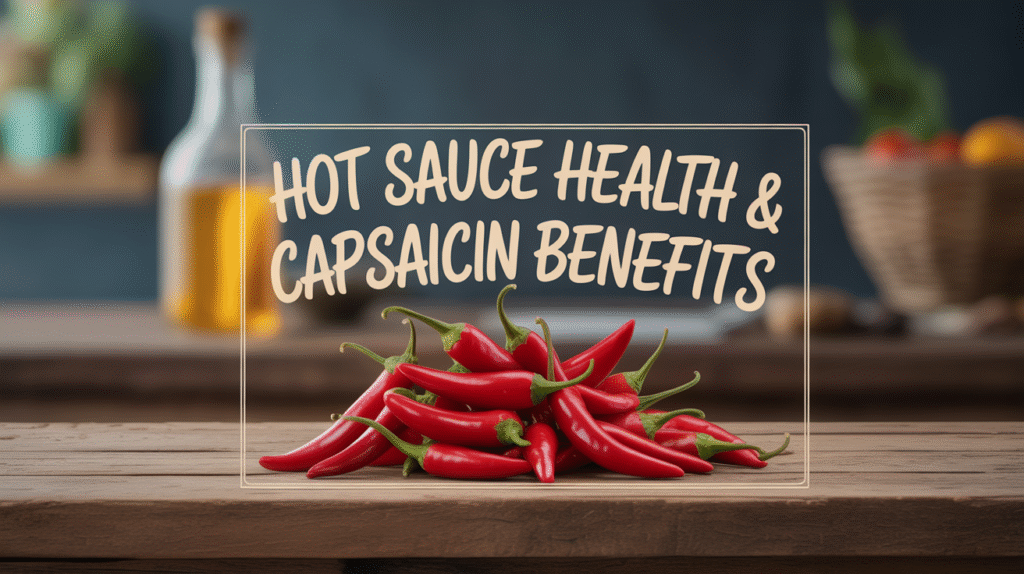Affiliate Disclosure: PantryBrands.co.uk is a participant in the Amazon.co.uk Associates Programme. As an Amazon Associate, we earn from qualifying purchases made through links on this site.
Hot sauce offers more than just fiery flavour—it provides several health benefits thanks to capsaicin, the natural compound responsible for its heat. Capsaicin has been studied for its positive effects on metabolism, pain relief, digestion, and even heart health. If you thought hot sauce was merely a spicy addition to your plate, think again. Here’s why adding it to your meals might also be adding value to your health.

What Is Capsaicin and Why Is It Important?
Capsaicin is a bioactive compound found in chilli peppers, and it’s the reason hot sauce feels hot. But it’s not just about the burn—it’s been researched extensively for its potential health effects.
How Capsaicin Works in the Body
Capsaicin interacts with the body’s pain receptors, but it does more than just trigger a burning sensation.
- Activates TRPV1 Receptors: These receptors respond to heat and physical abrasion, helping the body react to injury.
- Releases Endorphins: The body often responds to capsaicin by releasing feel-good hormones, which may improve mood and reduce stress.
Types of Hot Sauces That Contain High Capsaicin
Not all hot sauces offer the same capsaicin levels. Some are milder, while others are concentrated and packed with heat.
- Habanero and Ghost Pepper Sauces: These tend to have the highest capsaicin content.
- Jalapeño and Chipotle Sauces: Milder in comparison but still beneficial in moderate amounts.
Key Health Benefits of Capsaicin
Scientific research has linked capsaicin to several health advantages, particularly when consumed regularly in moderate amounts.
Boosts Metabolism and Supports Weight Loss
Capsaicin has thermogenic properties, which means it can increase your body’s heat production and energy expenditure.
- May Help Burn Calories: Studies show that capsaicin can temporarily boost metabolic rate.
- Reduces Appetite: It may lead to decreased calorie intake by reducing hunger cues.
Provides Natural Pain Relief
Though it causes a burning sensation initially, capsaicin has been used in topical creams and patches for pain management.
- Alleviates Joint and Muscle Pain: Capsaicin can desensitise pain receptors over time.
- Used for Neuropathic Pain: Effective in some cases of nerve-related pain such as diabetic neuropathy.
Supports Heart Health
Hot sauce may offer cardiovascular benefits when consumed as part of a balanced diet.
- Lowers Bad Cholesterol: Capsaicin may help reduce LDL cholesterol levels.
- Improves Circulation: Its warming effect promotes better blood flow and vessel dilation.
Additional Benefits of Eating Hot Sauce
Beyond capsaicin, many hot sauces contain ingredients with their own health perks.
Promotes Digestive Health
While some believe hot sauce can upset the stomach, moderate use may actually support digestion.
- Increases Digestive Fluids: Can stimulate stomach acids, aiding in digestion.
- Antimicrobial Properties: May help fight bacteria in food, reducing the risk of foodborne illness.
May Have Anti-Cancer Properties
Early research suggests capsaicin might influence cancer cells, though more studies are needed.
- Inhibits Cancer Cell Growth: Some lab studies show capsaicin can slow the growth of certain cancer cells.
- Triggers Apoptosis: It may prompt programmed cell death in abnormal cells.
How to Add Hot Sauce to Your Diet for Health Benefits
Incorporating hot sauce into your meals can be simple and enjoyable, but it should be done with care.
Use it to Replace Unhealthy Condiments
Swap calorie-dense sauces with hot sauce to improve the nutritional profile of your meals.
- Replace Creamy Dressings: Use hot sauce in vinaigrettes or as a base for healthy dips.
- Reduce Salt Use: The intensity of hot sauce can allow you to use less salt in dishes.
Start Small and Build Tolerance
Not everyone can handle extreme heat. Gradual exposure is the key to enjoying hot sauce without discomfort.
- Begin with Milder Sauces: Start with jalapeño or chipotle sauces.
- Mix with Other Ingredients: Blend hot sauce with yoghurt or hummus to tone down the heat.
Who Should Be Cautious About Hot Sauce?
While hot sauce has benefits, some individuals should exercise moderation or avoid it altogether.
People with Gastrointestinal Issues
Hot sauce may trigger symptoms in people with conditions like acid reflux or ulcers.
- Irritation Risk: Capsaicin can irritate an already sensitive digestive tract.
- Mild Sauces May Be Safer: Those with sensitive stomachs should opt for lower-heat varieties.
Those on Certain Medications
Hot sauce may interact with medications that affect the stomach lining or blood pressure.
- Consult a Healthcare Provider: Particularly if on heartburn or hypertension medications.
- Monitor Your Body’s Response: Discomfort or side effects mean you should cut back.
FAQs
Here are some questions and answers about hot sauce health and capsaicin benefits.
Does hot sauce really boost metabolism?
Yes, capsaicin in hot sauce can slightly increase metabolism by raising body temperature and energy expenditure. While not a magic solution for weight loss, it can support other efforts.
Is it safe to eat hot sauce every day?
In most cases, yes. Regular, moderate consumption of hot sauce is safe for healthy individuals. However, those with digestive conditions should consult a doctor.
Can hot sauce help with pain relief?
Yes, capsaicin is used in topical creams to relieve joint, muscle, and nerve pain. Eating hot sauce won’t produce the same effect but may offer a general anti-inflammatory benefit.
Does hot sauce have any vitamins or minerals?
Some hot sauces contain vitamin C and A, especially those made from fresh chillies. However, the amounts are generally small unless consumed in large quantities.
Can hot sauce lower cholesterol?
Some studies suggest capsaicin may help reduce LDL (bad) cholesterol and improve blood flow, supporting overall heart health when included in a balanced diet.
